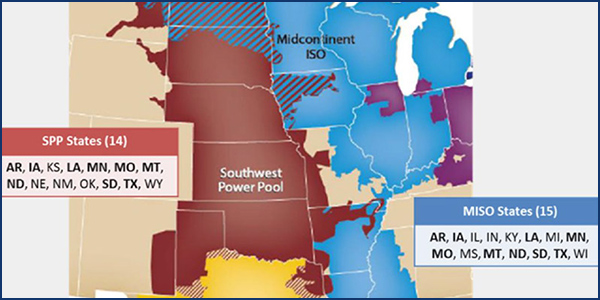MISO and SPP won’t undertake a major interregional transmission study in 2021, officials announced Friday.
The grid operators said planners are already tied up in the RTOs’ joint targeted interconnection queue study in a search for interregional projects to alleviate their jammed generator interconnection queues.
“Both MISO and SPP have very full plates in 2021,” SPP’s Neil Robertson told stakeholders during an Interregional Planning Stakeholder Advisory Committee meeting on March 26.
He said the joint queue study will examine “most, if not all, of the same congestion” that would be studied under a coordinated system study (CSP). The RTOs will hold a teleconference April 9 to discuss their joint interconnection study.
MISO and SPP have conducted four CSPs since 2014 but have yet to find a gainful project. (See 4th Time No Charm for MISO-SPP Interregional Study.)
Robertson said the one-year CSP pause will give the RTOs time to better line up cost estimates to construct projects.
“I would offer to this stakeholder group that SPP and MISO will address the varied cost estimates in terms of the interregional process and how we will prevent them from impeding projects,” he said, adding that the RTOs don’t yet have a blueprint for accomplishing that.
American Clean Power Association’s Daniel Hall urged the grid operators to pursue a fifth CSP, despite their additional planning responsibilities for 2021. He said the mid-February emergencies made clear that the RTOs could use cross-border projects to avoid load shedding and energy price spikes.
TMEP Category Likely Imminent
Robertson also said the RTOs will likely establish their own smaller interregional project type, similar to MISO’s and MISO, SPP Regulators Call for Pancaking Fix, Smaller Projects.)
“It’s clear that there are planning gaps in the SPP-MISO seam,” Missouri Public Service Commission Chair Ryan Silvey said.
Adopting a new TMEP-style project type might address some of those shortcomings, Silvey said, and could result in relieving the chronically congested Neosho-Riverton flowgate on the Kansas-Missouri border that habitually incurs millions of dollars in congestion costs.
Silvey said MISO and SPP shouldn’t “automatically” implement a carbon copy of the TMEP process, but they could apply aspects that make sense.
MISO and PJM debuted the project type in 2017. They have since approved two portfolios of the smaller congestion-relieving projects.





